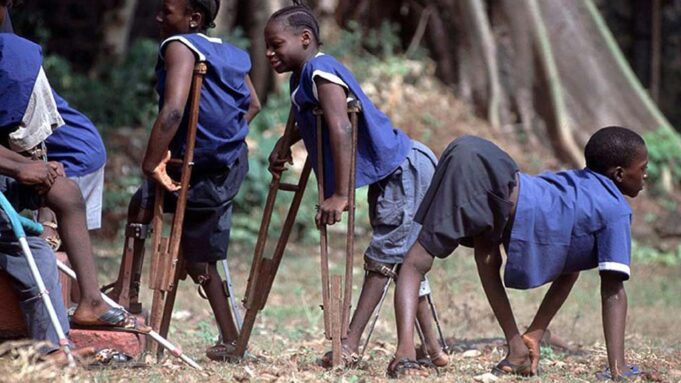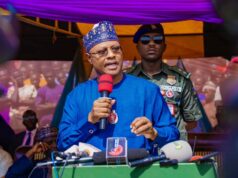A massive outbreak of vaccine-derived polio has been reported in Nigeria.
The Representative of the United Nation’s Children Fund (UNICEF) in Nigeria, Dr. Peter Hawkins, disclosed this in his remarks at the third Quarter Northern Traditional Leaders Committee on Primary Health Cares (PHC) review meeting on Monday in Abuja.
The Vaccine-derived cases are rare, and they differ from wild cases. There are two kinds of polio cases; Wild cases of polio are caused by poliovirus that is circulating naturally in the environment.
Vaccine-derived polioviruses are extremely rare and exist under specific circumstances. Oral polio vaccine contains live virus that is weakened so that it will prompt the body’s immune response without causing paralysis.
He noted that that vaccine is ingested, and the weakened virus replicates in the child’s gut and is then excreted.
“In areas with poor sanitation, this excreted vaccine virus can spread to other children. This can actually be good because it then immunizes them. When the strain no longer finds susceptible children, it dies out,” he added.
Hawkins warned against the dangers of undermining routine immunization.
“The problem occurs in areas of low vaccination. There, such vaccine-derived strains of the virus can continue to circulate as long as they continue to find unvaccinated or otherwise susceptible children.
“While they continue to circulate, they mutate. Eventually, if they are allowed to circulate long enough, at least 12 months, they can mutate into strains that are strong enough to cause paralysis,” he explained.
He assured that the oral polio vaccine had reduced the number of polio cases by 99.9 per cent. Noting that the risk posed by wild poliovirus was far greater than the risk of an outbreak caused by circulating vaccine-derived poliovirus:
The Executive Director of National Primary Health Care Development Agency (NPHCDA), Dr. Faisal Shuaib, noted that with the different disease outbreaks that the country is currently contending with, it was imperative that the approach becomes more integrated.
“This is because they are all interwoven. Amidst COVID-19, we have Cholera, CVDPV2 which is as a result of suboptimal routine immunization in some parts of the country.
“As we conduct outbreak response campaigns, we need to find a way to integrate our responses for efficient utilization of available resources and to enhance confidence in our people,” he added.
The NPHCDA noted that the Integration would also enhance the agency’s determination to continue to safeguard the wild polio virus free status.
“It is in the spirit of integration that we have adopted what we call the PSI (primary health care services integration) or ‘the whole of family approach’ for this second phase of the COVID-19 vaccination.
“It entails checking the blood pressure and assessing the diabetes risk status of clients 40 years and above and screening children 0 to 12 months for malnutrition and routine immunization status,” he explained.
The World Health Organisation (WHO) Representative, Dr. Kofi Boateng, stressed that in the delivery of quality PHC and the attainment of UHC, health security and routine immunization by the traditional leaders were crucial.
Also speaking, Alhaji Samala Muhammadu Mera, the Emir of Argungu, assured that the committee is working to ensure that all eligible Nigerians take the COVID-19 vaccines as they become available.
- Rivers, Kaduna, Ekiti, Ondo CPs, 7 others promoted AIGs, PSC approves 16 CPs - December 16, 2024
- Otuaro: Entrenching enduring peace in Niger Delta - December 16, 2024
- Fraud: EFCC arrests 792 Nigerians, Chinese, Filipinos in Lagos edifice - December 16, 2024










